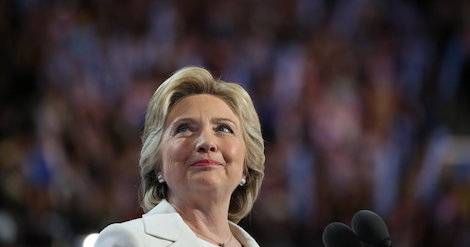
What It Means to Me to Have a Bookish Nominee
I learned something from Chelsea Clinton’s speech tonight: Hillary Clinton, as the first nominee who represents me fully, does so more than just on the basis of womanhood—
(Which I don’t discount. I will be wrung of tears by November. America’s children now have access to a gender-inclusive notion of the presidency. I am in awe. But beyond that:)
She is also a presidential nominee who represents another core part of me: she is a woman who shares books.
As Chelsea nodded to her mother for reading Chugga-Chugga Choo Choo to Charlotte over Facetime, and located favorite childhood memories in trips with her mother to the library, and in bedtime readings of Goodnight Moon, I realized that the Clintons also represented my reader-side–the part that knows that opening a book means opening the world wide with it.
Chelsea dropped titles in her speech easily–of Madeleine L’Engle‘s here; of Jane Austen‘s there. And she lauded her parents, simultaneously, for being the kind of parents who encouraged her to engage in the world–to question, to argue, to think, and to form her own opinion. These virtues are at the core of any reader’s soul.
Hillary leads, I learned, as a woman of written words–who left notes for her daughter to read when she could not be there herself, notes talking about the importance of public service and the needs that still exist amongst Americans born without the Clintons’ privilege.
Clinton followed those notes up in her own speech by admitting “the service part has always been easier for me than the public part.” You do righteous acts, because doing the right thing has the potential to move the world. Sure, you also try to interact with others in a way that encourages them to do the same, but that is sometimes a harder task.
What bookish soul doesn’t sympathize? In time with Hillary’s speech in Beijing, I was an elementary school girl who spent her lunchtime in the library, learning loads from characters in Gertrude Chandler Warner and the girls in the BSC–but from books held open on my lap while I looked out the window at my classmates, who found the learning from each other directly part a bit easier. The schoolyard term is “bookworm.” The political arena term is “stiff.” But there’s so much nuance beneath those labels.
It is staggering to know that my happiest, most certain childhood memories have something in common with those of the first daughter, who was looking up at White House ceilings, rather than my own: that “Goodnight Moon” translates to those locales. That we were introduced to the same wonder, and poetry, and portal to next steps. And to learn that the reader’s impulse transfers on to others in the same ways, too–because who doesn’t delight in the thought of having their daughter read to, long distance, by someone who cares? It’s important to me that Hillary and her daughter understand that a speech on a global stage stands to make an impact, but so, too, does a grandmother taking time out to read a story with her granddaughter.
That those on the DNC ticket appreciate the power of a page–the transformative ability of a few perfect words that work into you, and illuminate vistas of possibilities, all accessible with the right combination of imagination and work–means worlds to me. This is the representation I need: that of a person who closes a book and then reaches, immediately, for the next volume.
Closing this particular chapter of the DNC–while so much outside of Philadelphia’s hopeful arena seems uncertain; while a lack of imagination and empathy from less bookish ends of the political spectrum threatens to rend us–that found connection was something that moved me enormously.
I am grateful to have a presidential ticket before me that represents not only my interests as a woman and an ally, but as a reader.

















